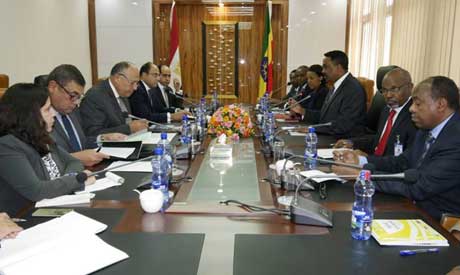
Egypt's foreign minister Sameh Shoukry met with Ethiopian counterpart Workneh Gebeyehu in Ethiopia's Addis Appapa (Photo: https://www.facebook.com/MFAEgypt/)
Egypt's foreign minister Sameh Shoukry suggested in a meeting on Tuesday with Ethiopian counterpart Workneh Gebeyehu that the World Bank act as an impartial third party in the technical committee studying the effects of construction of the Grand Ethiopian Renaissance Dam (GERD) on downstream countries.
Shoukry said that the bank has experience that could facilitate reaching an agreement within the tripartite committee, according to ministry spokesperson Ahmed Abu Zeid.
Shoukry expressed Egypt's trust in the World Bank's impartiality and its ability to use efficient technical experts, adding that he will submit this recommendation to Sudan within days.
Gebeyehu promised to study the Egyptian proposal and respond in the earliest opportunity.
The meeting between Shoukry and Gebeyehu was held in Ethiopia's Addis Ababa to discuss "breaking the deadlock" regarding the work of the tripartite technical committee of Egypt, Ethiopia and Sudan.
The Egyptian minister stressed how critical the Nile's water supply is for Egypt's security, adding that "promises and good intentions are not enough."
Shoukry said the three countries should be committed to the framework of the March 2015 trilateral agreement known as the Declaration of Principles signed by Egypt, Sudan and Ethiopia, particularly in regards to the dam's filling process and annual operations.
Shoukry also expressed Egypt's concern over the setbacks in the work of the tripartite technical committee, which is impeding progress on the impact studies.
Last November, negotiations between the three countries broke down over how to conduct technical studies of the dam's potential impact on downstream countries, where Egypt approved the initial report by the European consultancy firms, though Ethiopia and Sudan demanded major amendments to the proposed studies.
Shoukry said that Egypt approved the initial report given that it is a technical study that bears neither interpretation nor politicisation, adding that Egypt trusts the professionalism and impartiality of the consultancy firm.
Shoukry also stressed that the Declaration of Principles is clear on the importance of conducting the studies before the filling process begins and that all three countries should be in agreement on the rules of filling and operating the dam.
Gebeyehu said that his country is committed to the Declaration of Principles and the success of negotiations and cooperation between the three countries, stressing that Ethiopia has no intention of harming Egypt's water interests.
Shoukry also met with Ethiopian Prime Minister Hailemariam Desalegn, where they discussed the upcoming visit by Desalegn to Cairo in January, Abo Zeid said.
Shoukry and Desalegn also discussed bilateral relations as well as the challenges facing negotiations over the Renaissance Dam.
According to the Declaration of Principles, disputes should initially be referred to the ministerial level. If the disputes are not resolved, they should be referred to the level of foreign ministers, and then to the presidential level.
Referring the dispute on the studies to the ministerial level took five months, after which it was referred to the higher level of foreign ministers, according to Egypt's State Information Service.
The dam, situated near Ethiopia's border with Sudan, is slated for completion next year and is expected to generate 6,000 megawatts of electricity.
Ethiopia hopes to be able to export electricity generated by the dam, which will be the largest hydroelectric power plant in Africa.
Egypt, however, has expressed concerns that the dam might reduce its share of Nile water that stands at 55 million cubic metres currently.
Ethiopia maintains that the dam will not have any negative impact on Egypt or Sudan.
Short link: